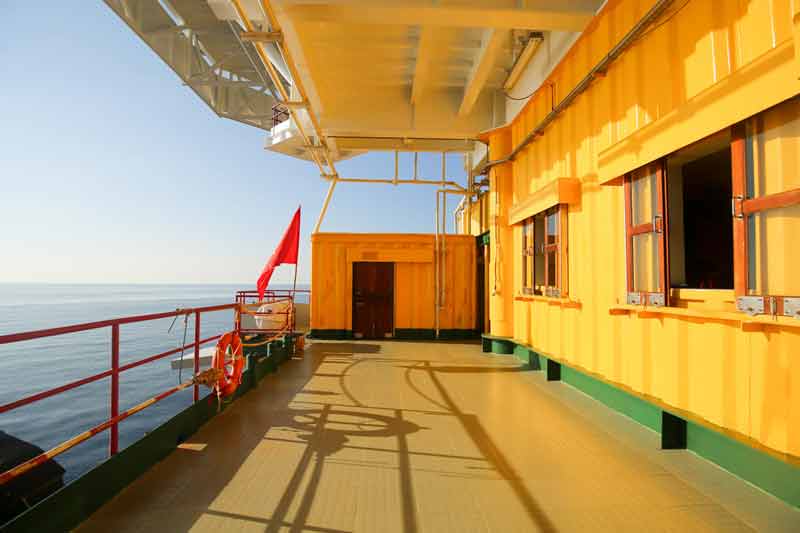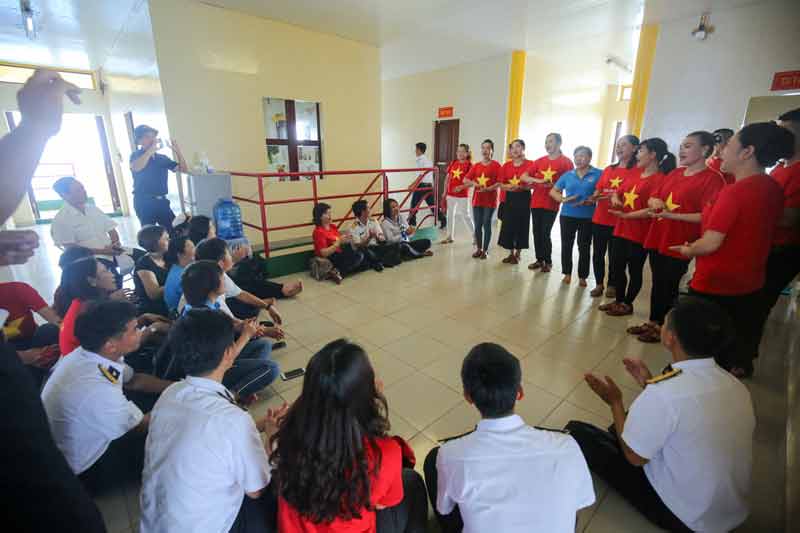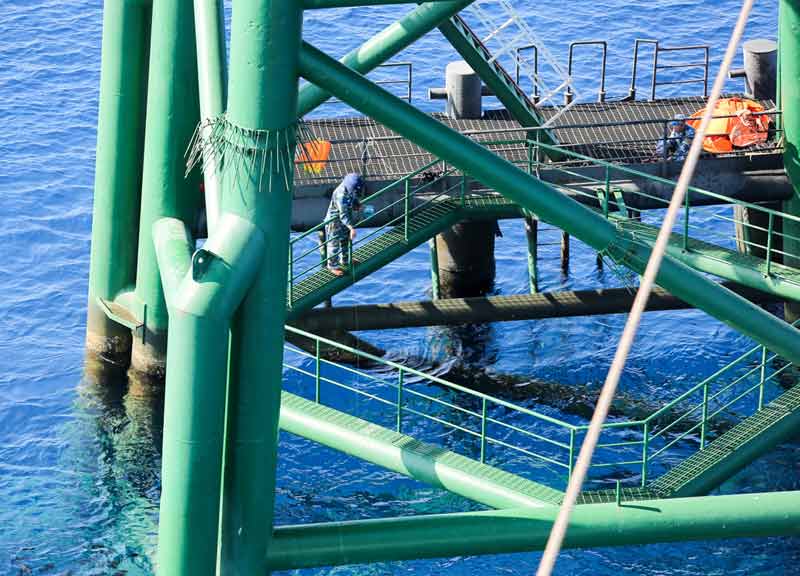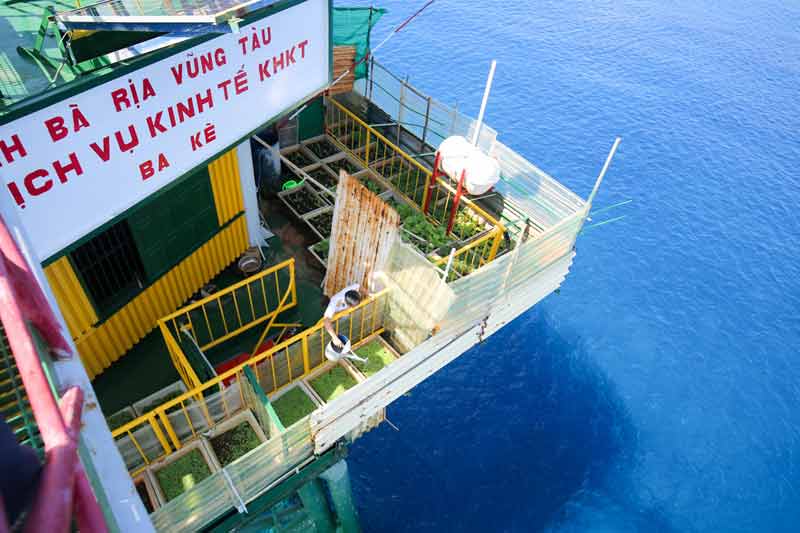
On the occasion of the 30th anniversary of the establishment of DK1 battalion (July 5, 1989 – July 5, 2019), NDO introduces photos about the houses on the sea, the creativity, determination and courageous sacrifice of naval soldiers on the rig-house.
 DK1
is the name of an Economics - science - service block built in the form of rig
houses, on the southern continental shelf of Vietnam, about 250 - 350 nautical
miles from the mainland. The cluster houses (DK) are understood as works for
civilian purposes at sea.
DK1
is the name of an Economics - science - service block built in the form of rig
houses, on the southern continental shelf of Vietnam, about 250 - 350 nautical
miles from the mainland. The cluster houses (DK) are understood as works for
civilian purposes at sea.
 A cluster of DK1 rig
houses located on Que Duong, Phuc Nguyen, Tu Chinh, Phuc Tan and Ba Ke sandbar.
The sea area of the DK1 has a bottom that is stretched from the shore to a
depth of 200m.
A cluster of DK1 rig
houses located on Que Duong, Phuc Nguyen, Tu Chinh, Phuc Tan and Ba Ke sandbar.
The sea area of the DK1 has a bottom that is stretched from the shore to a
depth of 200m.
 Each rig-house is 30m higher than the sea level, the
depth from the base of the sea-floor rig to the coral bottom is about 20-25m.
The foundation piles system of the rig-houses is deep from coral bottom surface
to 30-40m more to maintain the rig house.
Each rig-house is 30m higher than the sea level, the
depth from the base of the sea-floor rig to the coral bottom is about 20-25m.
The foundation piles system of the rig-houses is deep from coral bottom surface
to 30-40m more to maintain the rig house.
 Working group No. 12 arrives the DK1 / 9 Ba Ke rig house
to visit and encourage soldiers.
Working group No. 12 arrives the DK1 / 9 Ba Ke rig house
to visit and encourage soldiers.
 Smiles of navy soldiers. For them, the warm feeling of
people from the mainland is the greatest gift.
Smiles of navy soldiers. For them, the warm feeling of
people from the mainland is the greatest gift.
 The living quarters of the soldiers were designed with
steel and painted yellow against rust. All are designed to withstand heavy
storms.
The living quarters of the soldiers were designed with
steel and painted yellow against rust. All are designed to withstand heavy
storms.
 Exchanging programmes between ensemble and navy soliders.
Exchanging programmes between ensemble and navy soliders.
 It is often built on coral reefs, so it is often very
diverse in seafood houses. In their free time, soldiers often go to the bottom
of the rig-house to fish for daily meals.
It is often built on coral reefs, so it is often very
diverse in seafood houses. In their free time, soldiers often go to the bottom
of the rig-house to fish for daily meals.
 Green vegetables are always a challenge for people living
in climates with salt and sunshine all year round, when fresh water is so rare.
Green vegetables are always a challenge for people living
in climates with salt and sunshine all year round, when fresh water is so rare.
Source: NDO
In the last historic days of April, blending with the joyful atmosphere of the whole country, on the streets of Hoa Binh City, flags, banners and slogans are brilliantly decorated to celebrate the 50th Anniversary of Southern Liberation and National Reunification. Here are the records from Hoa Binh newspaper’s reporters:
Nestled halfway up the mountains in Cao Son commune, Da Bac district, Sung village appears like a picture preserved intact through generations. With a history of over 300 years, the village is home to nearly 100 households of Dao Tien ethnic group – the people who still maintain their distinctive characteristics in housing architecture, clothing, customs and traditional crafts. The village is drawing increasing interest and exploration from both domestic and international tourists, as every visit becomes a cultural journey to experience the authenticity, friendliness, and hospitality of this highland region.
This Spring, more than 1,000 phoenix trees in Thang Hamlet, Thach Yen Commune (Cao Phong) have bloomed brilliantly, quickly spreading on social media. The picturesque beauty of the flower garden has attracted the participation of many people to admire and take photos.
This belief is both a guiding principle and a lifelong ambition for Sa Van Cam, a member of the Tay ethnic group in Da Bac district and a passionate advocate for the Tay culture. The native has devoted years to the revival, preservation, and teaching of the ancient Tay script.
Located just 25 km from Hoa Binh city and approximately 100km from Hanoi, with a journey of around 1 hour 45 minutes, Ngoi Hoa ecotourism site (PriorBay Resort) in Suoi Hoa commune, Tan Lac district, is a stunning peninsula retreat, and a standout destination within the Hoa Binh Reservoir tourism area. Officially opening in February this year, the resort captivates visitors with its distinctive vacation products and a range of exciting adventure experiences.
Over 1,500 women paraded in traditional ao dai (long dress) at Hoa Binh Square on March 5 to mark Ao Dai Week 2025 launched by the Vietnam Women's Union. Organised by the provincial Women’s Union in collaboration with the city’s chapter, the annual event features lively folk dance performances and a colorful parade that celebrated the beauty of Vietnam’s traditional dress and its rich cultural heritage.



 DK1
is the name of an Economics - science - service block built in the form of rig
houses, on the southern continental shelf of Vietnam, about 250 - 350 nautical
miles from the mainland. The cluster houses (DK) are understood as works for
civilian purposes at sea.
DK1
is the name of an Economics - science - service block built in the form of rig
houses, on the southern continental shelf of Vietnam, about 250 - 350 nautical
miles from the mainland. The cluster houses (DK) are understood as works for
civilian purposes at sea. A cluster of DK1 rig
houses located on Que Duong, Phuc Nguyen, Tu Chinh, Phuc Tan and Ba Ke sandbar.
The sea area of the DK1 has a bottom that is stretched from the shore to a
depth of 200m.
A cluster of DK1 rig
houses located on Que Duong, Phuc Nguyen, Tu Chinh, Phuc Tan and Ba Ke sandbar.
The sea area of the DK1 has a bottom that is stretched from the shore to a
depth of 200m. Each rig-house is 30m higher than the sea level, the
depth from the base of the sea-floor rig to the coral bottom is about 20-25m.
The foundation piles system of the rig-houses is deep from coral bottom surface
to 30-40m more to maintain the rig house.
Each rig-house is 30m higher than the sea level, the
depth from the base of the sea-floor rig to the coral bottom is about 20-25m.
The foundation piles system of the rig-houses is deep from coral bottom surface
to 30-40m more to maintain the rig house. Working group No. 12 arrives the DK1 / 9 Ba Ke rig house
to visit and encourage soldiers.
Working group No. 12 arrives the DK1 / 9 Ba Ke rig house
to visit and encourage soldiers. Smiles of navy soldiers. For them, the warm feeling of
people from the mainland is the greatest gift.
Smiles of navy soldiers. For them, the warm feeling of
people from the mainland is the greatest gift. The living quarters of the soldiers were designed with
steel and painted yellow against rust. All are designed to withstand heavy
storms.
The living quarters of the soldiers were designed with
steel and painted yellow against rust. All are designed to withstand heavy
storms. Exchanging programmes between ensemble and navy soliders.
Exchanging programmes between ensemble and navy soliders. It is often built on coral reefs, so it is often very
diverse in seafood houses. In their free time, soldiers often go to the bottom
of the rig-house to fish for daily meals.
It is often built on coral reefs, so it is often very
diverse in seafood houses. In their free time, soldiers often go to the bottom
of the rig-house to fish for daily meals. Green vegetables are always a challenge for people living
in climates with salt and sunshine all year round, when fresh water is so rare.
Green vegetables are always a challenge for people living
in climates with salt and sunshine all year round, when fresh water is so rare.